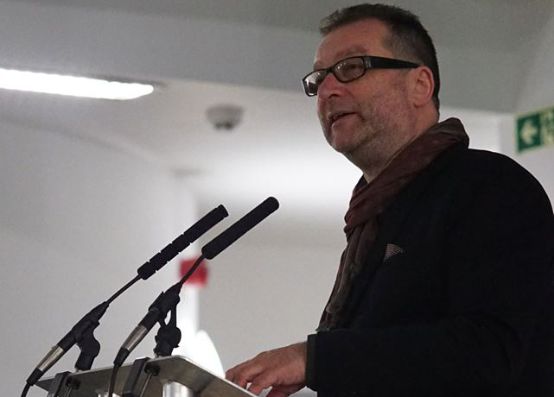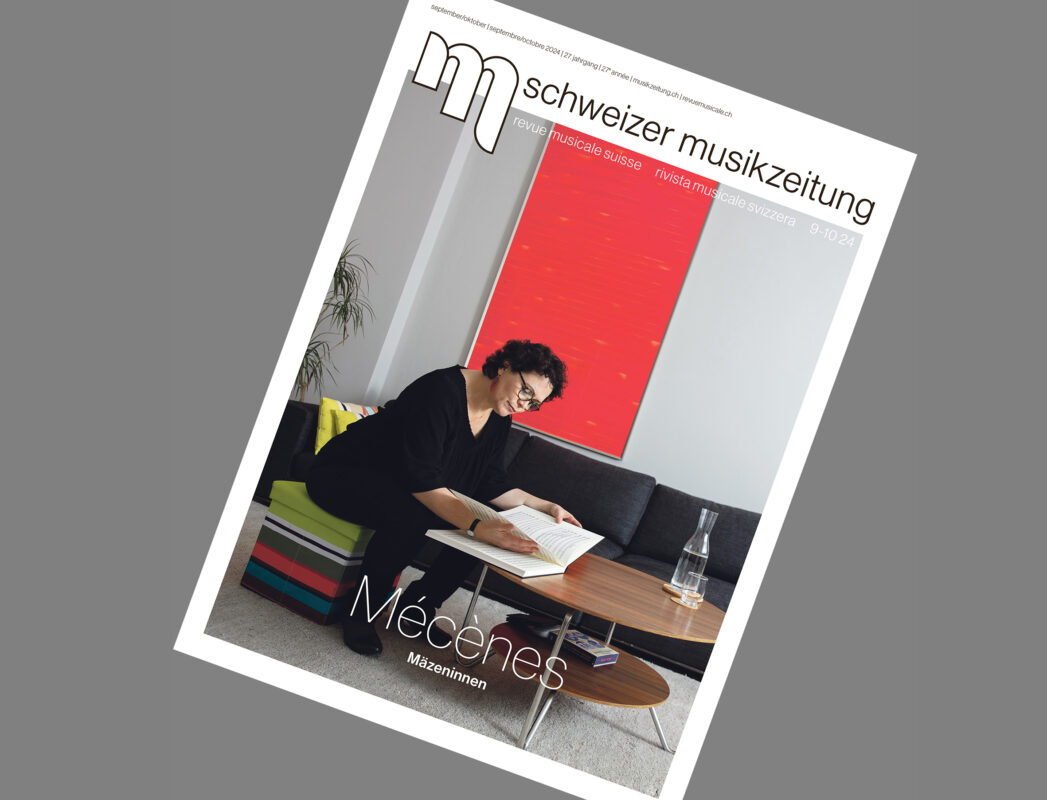The king of the festival
The Huddersfield Contemporary Music Festival is one of the most important festivals in the field of new music. It was founded in 1978. Scotsman Graham McKenzie has been its director for ten years. Unlike other festivals, no committee determines the concept, content and course of the festival. Graham McKenzie is solely responsible for the program and all other aspects of the event.


The Huddersfield Contemporary Music Festival is one of the most important festivals in the field of new music. It was founded in 1978. Scotsman Graham McKenzie has been its director for ten years. Unlike other festivals, no committee determines the concept, content and course of the festival. Graham McKenzie is solely responsible for the program and all other aspects of the event.
What was your career like before you came to Huddersfield?
Graham McKenzie: I never studied music. I started my professional life as a social worker in London. I was also a big jazz fan. Once a month I'd get on the night bus to Paris on a Friday, go to the New Morning Jazz Club and buy new records at the market. Then I took the night bus to Amsterdam and went to two or three other clubs. Thanks to the overnight bus on Sunday evening, I was able to get back to work on time on Monday. Word got around, and over time I was asked more and more often to write concert reviews and interviews.
Was the scene in Paris and Amsterdam so much better than in London?
Wherever you live, the scene seems to be better elsewhere.
But even back then there was the Vortex Club and the London Musiciansʼ Coop?
Yes, but there were other things going on. The free improvisers never got much work in London. Anyway, I also liked to deal with rock music. So one day I was commissioned to write a report on the Pink Pop Festival in Holland. It lasted three days and I stayed for almost two years. During this time, I deepened my interest in experimental music. After nine years, I gave up my job as a social worker to write - not music journalism, but plays. One of them is still on the curriculum in Scottish schools. Then Glasgow was named "City of Culture". Because I was familiar with both the social sector and the cultural sector, I was invited to help conceptualize the festival. Along the way, I organized concerts with artists I wanted to see myself - Linton Kwesi Johnson, John Cooper Clarke, Anthony Braxton, Marilyn Crispell and many others. The last stop before Huddersfield was the directorship of the Centre for Contemporary Arts in Glasgow (CCA).
Does the planning of the Huddersfield Contemporary Music Festival start with a specific theme?
I hate themes! Just never a themed program! Programs are for lazy programmers. It also adds another layer of intellectuality, and that's really the last thing this music needs. All those who are marginally interested in the music, the curious, they now have to try to understand not only the music but also the subject. In Huddersfield I am in a wonderful, privileged position. I don't have to answer to any composers' committee or any other body. Everything that happens here is my fault.
So what we get to see at this festival is the music that you have discovered for yourself in the last few years?
That's how it is. Of course there are projects that you work on for years, and artists that you work with or want to work with for a long time. When I arrived here, I had the feeling that the festival had become a bit too academic in its orientation. The program was revolving in ever narrower circles. It seemed to me that the audience had become 25 years older. The relevance had dwindled. I wanted to change that.
How wide is your stylistic range?
For me, the spectrum ranges from noise to orchestral works, with everything in between, electronica, improvisation, installations, sound art, and so on. It is also important to me that the audience has to move from venue to venue in order to experience a wide variety of sounds. So this year we started with Klangforum Wien, a fantastic chamber music ensemble. Then we went over to the Bates Mill for a concert that was very visual, with lots of electronics and even a touch of dubstep. Someone walked out of a concert early today complaining, "Graham McKenzie, is he trying to ruin our ears?" I don't put my program together for that type of person. If he thinks it was loud today, he should have been at Led Zeppelin in 1974!
Have you really been able to attract a younger audience in this way?
In my first year, about 3% of the audience was between 17 and 25 years old. Today there are around 28%.
A very mixed audience, I noticed that too.
Many new music festivals worry about how to attract a younger audience. Audiences get younger when you invite younger composers and musicians! When I ran the CCA in Glasgow, it was natural to engage with the next generation of arts students. In new music, on the other hand, people constantly wanted me to celebrate 70th and 80th birthdays. Even among music publishers, the prevailing attitude was that a composer couldn't really be called a composer unless he was at least sixty years old. In my first year in Huddersfield, Yannis Kyriakides was composer in residence, a Cypriot living in Amsterdam. He was 37 years old at the time. At the press conference for the launch of the festival, a journalist stood up and was very indignant: "How can you appoint this young man as composer in residence when there are all the great, old, ignored masters?" My response was short: "Do you want to create another generation of great, old, ignored masters?"
You previously said that there was a different scene in Amsterdam than in London. Can you still see similar differences today?
The countries that interest me the most, where the scene seems the most vital and innovative, are countries where it is possible for a musician to work in different genres at the same time. It's been a big weakness in the UK for a long time that you're pigeonholed into a genre that you're never let out of. Scenes that have left a global mark in recent years, such as Norway, are characterized by the fact that there is hardly any division into genres. You can be a composer and a folk musician, improviser or even an installation artist at the same time. It doesn't harm your career. This category thinking in the UK is really unhealthy. When I was appointed director of Huddersfield, a critic in a major newspaper complained: "A disaster - KcKenzie is a jazz man, he will turn Huddersfield into a jazz festival." A jazz critic from Glasgow responded with a letter to the editor: "Don't worry, he hasn't programmed anything I would have considered jazz at the Glasgow Jazz Festival for twenty years."
What prompted you to embark on this three-year association with the Swiss scene?
When I invite foreign composers and musicians, I do so with the idea in mind that an exchange with English musicians could develop. That we could create the possibility of triggering synergies. I'm interested in a fluid, long-term collaboration with potential for the future. I'm not interested in showcases. Of course, I have been following the work of certain Swiss artists for a long time, Jürg Frey for example. Or Alfred Zimmerlin. Arturo Canales. I think Andri Hardmeier from Pro Helvetia was a little surprised at some of the composers I was particularly interested in. And that also makes such a connection exciting. Sometimes it takes an outsider's perspective to pick out the things that can also have special significance outside a particular scene.
How did you choose the locations for Jürg Frey's sound installations?
Jürg came to Huddersfield and we looked at various venues and then chose the right ones. I don't dictate to the invited composers which pieces they should bring to us. It's important to give them the opportunity to present themselves as they see themselves today, at this moment. It would be pointless if I were to put together a program for a composer or ensemble in order to establish their identity in England - and then it turns out that they are doing something completely different in the meantime! It happened to me two years ago that I was invited to a performance of one of my plays. I found it quite interesting - but the person who had written the play was a completely different person to the one who was now sitting there and marveling. For me, programming is about showing the current state of mind of an artist, not how I imagine it after finding a thirty-year-old record at a flea market that I like.
Huddersfield is not necessarily in the center of the world. What kind of audience comes to the festival during the week?
On weekdays, 40% of the public come from within an hour's drive. However, Huddersfield is in a central location - roughly halfway between Leeds and Manchester. Sheffield and York are not far away either. And it's perfectly possible to go to a concert in the evening and still get back to Liverpool or Newcastle by train. But we also sell tickets in Japan, the USA, Canada and throughout Europe.
The Huddersfield Contemporary Music Festival is very similar to independent record labels in the classical style, where one or two music fans decide on the program, and you know that you might not like everything that appears, but in any case everything is somehow interesting.
That's how it is. It's up to me to stand there and say: "Guys, this is interesting!" As a curator, you can only want to please yourself. As soon as you start thinking about whether a certain thing might appeal to a certain audience, things usually go wrong. You have to believe in it. So it's all the nicer when it clicks. The reactions to Jürg Frey's work were a real revelation for me. The BBC not only featured him on Radio 3, where you would have expected it, but also on BBC 6, where you usually hear more guitars and drums. A rock magazine also came along. That's great, of course. But I'm also arrogant enough to believe that if I like something and you don't, you simply haven't understood it yet and will understand it eventually. On the other hand, I have to admit that I don't necessarily like everything that is played here. For example, I'm not a fan of noise. Nevertheless, I believe that this music belongs here. My rule of thumb is this: At every edition of the festival, I allow myself five concerts that I either deeply dislike or am severely disappointed by. More than five and I'm in the wrong job. Then I have to leave.
Thank you very much for the interview! Is there anything else you would like to add?
Irène Schweizer. I was the only one who brought Irène Schweizer to Glasgow. A long time ago she recorded an album with a group of Indian musicians. For the last two years I've been working on her to try a similar experiment in Huddersfield. I really hope it comes off!

- HCMF
- Poster of the Huddersfield Contemporary Music Festival 2015








